|
|
Post by rockpickerforever on Apr 29, 2019 17:21:42 GMT -5
Maybe it's because I'm new at trying to cab, but I like to freeform. Besides, any rock I've tried to cab yet seems to have a mind of it's own and seems to decide what shape it wants to be.  I love freeforms! That's exactly right, it let's the rock decide what it wants to be. No constraints, you don't have to force it to bend to your will. It also maximizes your material. |
|
|
|
Post by rockjunquie on Apr 29, 2019 18:30:57 GMT -5
Maybe it's because I'm new at trying to cab, but I like to freeform. Besides, any rock I've tried to cab yet seems to have a mind of it's own and seems to decide what shape it wants to be.  I love freeforms! That's exactly right, it let's the rock decide what it wants to be. No constraints, you don't have to force it to bend to your will. It also maximizes your material. I'm liking them more and more and esp since I am getting more comfortable with them. At first, I would never do them because I didn't want to mess anything up. Now, I have more fun with broken and leftover pieces. |
|
|
|
Post by Rockindad on Apr 29, 2019 18:36:08 GMT -5
To Make A Double Sided Template
A very easy trick I used to use frequently in my woodworking:
-Take two of the same templates and stack them so they match
-Insert the material you want to cut, in this case a slab
-Line up the edges of the templates so the edges are flush, you can use anything that is perpendicular to the surface the templates are laying on- a table saw fence, wall, block of wood etc.
-Tape the templates together book binding style maintaining the gap. Type of tape and amount used depends on how permanent you want this to be.
Al
|
|
|
|
Post by rockpickerforever on Apr 29, 2019 20:59:10 GMT -5
I love freeforms! That's exactly right, it let's the rock decide what it wants to be. No constraints, you don't have to force it to bend to your will. It also maximizes your material. I'm liking them more and more and esp since I am getting more comfortable with them. At first, I would never do them because I didn't want to mess anything up. Now, I have more fun with broken and leftover pieces. The broken and leftover pieces I consider preforms!  |
|
|
|
Post by miket on Apr 30, 2019 9:19:57 GMT -5
I'm liking them more and more and esp since I am getting more comfortable with them. At first, I would never do them because I didn't want to mess anything up. Now, I have more fun with broken and leftover pieces. The broken and leftover pieces I consider preforms!  Exactly how I feel, ladies... Course I haven't started trying to wrap yet. I'm sure it depends on the shape, but are freeforms any harder to wrap? |
|
NevadaBill
fully equipped rock polisher
  
Member since January 2019
Posts: 1,332
|
Post by NevadaBill on Apr 30, 2019 9:36:11 GMT -5
Oh I forgot, I have one with circles and one with ovals from Hobby Lobby. If I were just starting out I'd get the ones from Cool Tools on Amazon. I paid a lot for the ones I got from Cabtopia and only use a couple from each template. It's true about getting bored but you have to start somewhere. I tried to cut my own and made a huge mess of it using an exacto (sp) and some sheet plastic that was supposed to be for stenciling. I've heard that if you're cutting you own to use a leather cutting tool that has a swivel on it. I'm really handy with cutting & such and was really surprised when I failed miserably at making my own. The little metal ones from Lortone aren't exciting at all and they're small. Thanks Julie. That is some really nice advice packed in to the paragraph you wrote there. We have a Hobby Lobby not far from me, so thank you for mentioning that! We also have a Joann's, which is a great hobby resource also. I didn't think about them. I bought the Dop Buddy, Dop Wax, and Templates from Kingsley North ( kingsleynorth.com/ ), all together. I could have gotten all of it from Graves as well, for almost the same price ( gravescompany.com/ ). I read reviews on the Lortone templates (on Amazon I think), and a lot of people were saying that they were small, and more suited to fine jewelry making. |
|
NevadaBill
fully equipped rock polisher
  
Member since January 2019
Posts: 1,332
|
Post by NevadaBill on Apr 30, 2019 9:41:00 GMT -5
I am not sure about what a free-form is. But I imagine that it is always nice to re-purpose material that you were thinking about discarding.
Does anyone have a picture of a free-form which they would like to share, for reference?
|
|
|
|
Post by rockjunquie on Apr 30, 2019 9:45:37 GMT -5
The broken and leftover pieces I consider preforms!  Exactly how I feel, ladies... Course I haven't started trying to wrap yet. I'm sure it depends on the shape, but are freeforms any harder to wrap? No more difficult, at all  |
|
|
|
Post by rockjunquie on Apr 30, 2019 9:48:01 GMT -5
My templates and I just ordered more. As you can see, it's quite the variety. The upper left are my own. A whole stack and examples. Look at drafting templates, too. 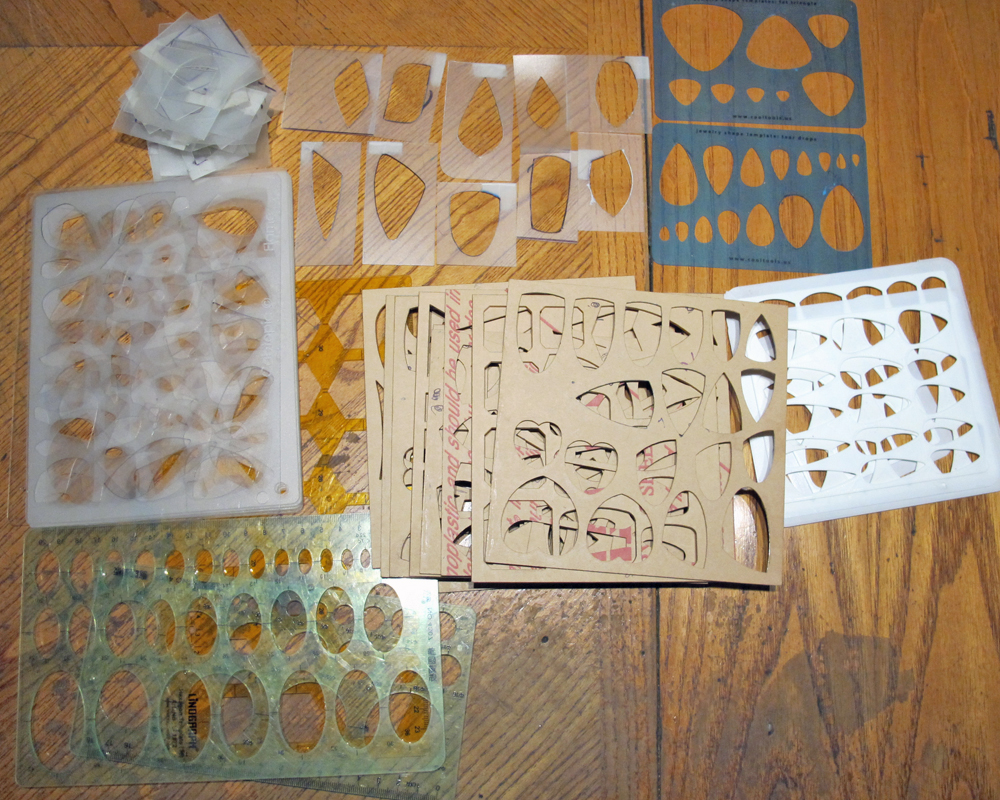 |
|
|
|
Post by rockjunquie on Apr 30, 2019 9:49:06 GMT -5
I am not sure about what a free-form is. But I imagine that it is always nice to re-purpose material that you were thinking about discarding. Does anyone have a picture of a free-form which they would like to share, for reference? Lots of freeforms posted here. I think all of Tommy's are. It's a cab you didn't use a template for. |
|
|
|
Post by rockpickerforever on Apr 30, 2019 10:07:39 GMT -5
I am not sure about what a free-form is. But I imagine that it is always nice to re-purpose material that you were thinking about discarding. Does anyone have a picture of a free-form which they would like to share, for reference? Any stone that does not fit a prescribed shape (round, oval, pear, etc) is said to be a free-form. Free-form only means the final shape is not predetermined, set in stone (pun intended). You are not trying to make a calibrated stone (both size and shape) to fit a pre-made, off-the-shelf fitting. Unless one has silversmithing skills, this is the option many people take to set their stones. Another setting option is wire wrapping. I've always liked to make free-forms because it means I don't have to break out a trim saw, lol. Take a fragment of slab (slabette), eyeball it to find the best features, then shape it to incorporate those features. I'm not talking any odd shapes, mostly round triangles, or oblong ovals and rounds. I don't mark them out, just keep going until the stone is a pleasing shape, then finish cabbing it. Wrapping a free-form stone not any different than a calibrated stone. Almost more important than the stone's shape is the girdle - angle, proper thickness and even edge. |
|
|
|
Post by rockjunquie on Apr 30, 2019 10:12:05 GMT -5
I am not sure about what a free-form is. But I imagine that it is always nice to re-purpose material that you were thinking about discarding. Does anyone have a picture of a free-form which they would like to share, for reference? Lots of freeforms posted here. I think all of Tommy 's are. It's a cab you didn't use a template for. I'm quoting myself.  I just finished one that started out with a template and ended up freeform, so there's that, too. One edge blew out, so an oval became a pear. ETA- I should also add that sometimes a tempate precab just wants to turn into something else- like the template was guide. |
|
Tommy
Administrator 
Member since January 2013
Posts: 12,993
|
Post by Tommy on Apr 30, 2019 13:07:01 GMT -5
Lots of freeforms posted here. I think all of Tommy 's are. It's a cab you didn't use a template for. It is a fact that most of my cabs end up as freeforms - or uncalibrated versions of recognizable shapes. Take this Black Rock Desert thunderegg cab from yesterday for instance. 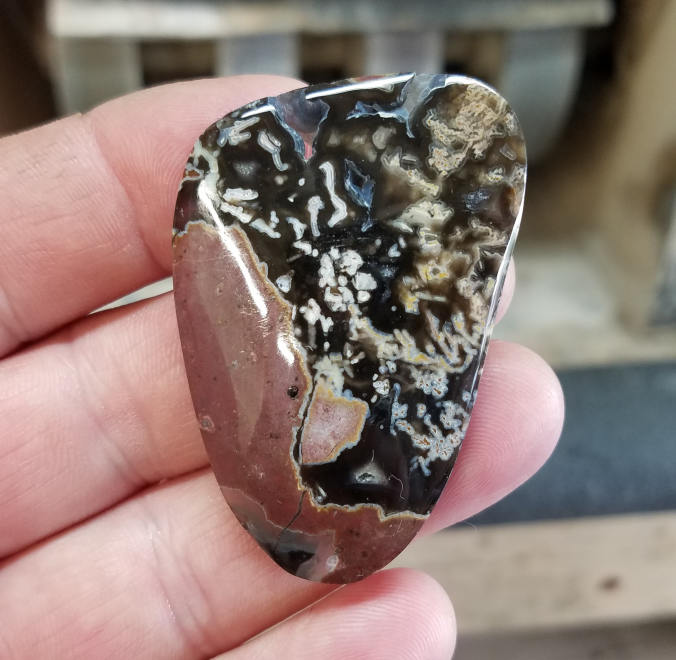 However, the little known fact though is that almost every cab I create starts with a template drawing - if nothing more than just to envision what shape the space is best suited for. I have and constantly use a complete set of Great Shapes templates bought from The Gem Shop. I also frequently fall back on the original set made by Tony that rockjunquie referenced earlier. I printed Tony's shapes out on an 8.5 x 11 Avery self adhesive ink jet paper, peeled and stuck the page to a 9" x 12" sheet of thin (10-mil) polycarbonate then hand cut the shapes out with a Xacto knife. Where it went wonky was I couldn't peel the paper off so I have these opaque templates that I really don't like as well as if they were transparent so I can see the stone. So, back to the freeforming of cabs. What happens every time (unless I really have my mind set on a specific shape like my Aztec Lace in this month's cab contest) is I draw out the shapes in aluminum scribe on every square inch of an entire slab as soon as I get it, then mark again with black sharpie cut lines and chop them up and all the preforms go in a drawer until usage. When it comes time to create a cabochon, almost invariable I cannot part with the extra material between the aluminum scribe lines and the black sharpie cut lines and so I end up cabbing to the sharpie lines and end up with wonky freeform shapes. For instance - here is another Black Rock Desert thunder egg preform that I will hopefully work on today. The shape was envisioned and marked using a Great Shapes template but when it comes time to cab this piece I'll probably just grab it and start grinding a dome and worry about the shape later. 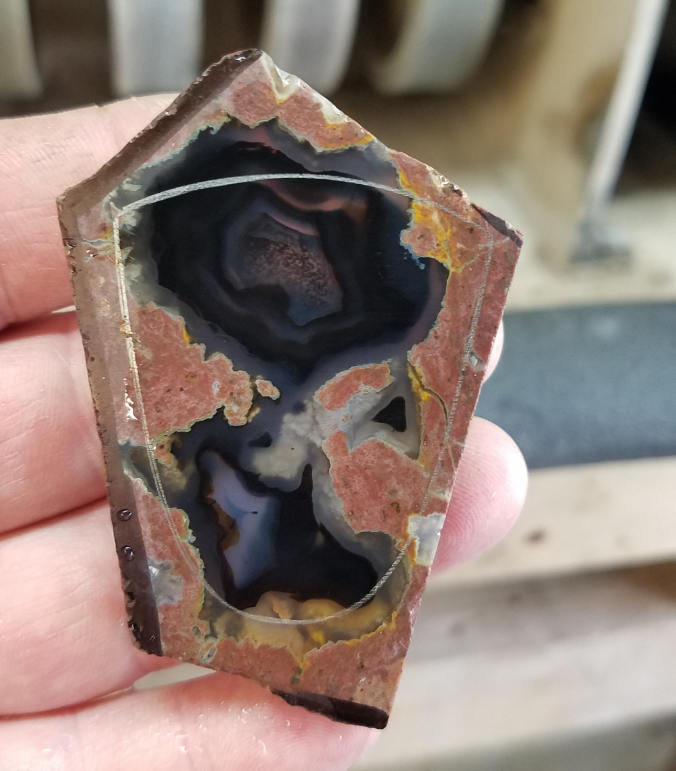 What I end up with is a weird freeform shapes, but over the years I've the sold weird shapes every bit as often as identifiable shapes, so there is no motivation to change now. It has kind of become a 'thing' for me I guess. |
|
|
|
Post by rockpickerforever on Apr 30, 2019 13:19:56 GMT -5
What I end up with is a weird freeform shapes, but over the years I've the sold weird shapes every bit as often as identifiable shapes, so there is no motivation to change now. It has kind of become a 'thing' for me I guess. Your signature, if you will. I always wondered how you came up with some of those "wonky" shapes, lol. Now I know! ETA - There is no right or wrong, whatever works... And obviously, it does |
|
|
|
Post by MsAli on Apr 30, 2019 13:27:26 GMT -5
Lots of freeforms posted here. I think all of Tommy 's are. It's a cab you didn't use a template for. It is a fact that most of my cabs end up as freeforms - or uncalibrated versions of recognizable shapes. Take this Black Rock Desert thunderegg cab from yesterday for instance.  However, the little known fact though is that almost every cab I create starts with a template drawing - if nothing more than just to envision what shape the space is best suited for. I have and constantly use a complete set of Great Shapes templates bought from The Gem Shop. I also frequently fall back on the original set made by Tony that rockjunquie referenced earlier. I printed Tony's shapes out on an 8.5 x 11 Avery self adhesive ink jet paper, peeled and stuck the page to a 9" x 12" sheet of thin (10-mil) polycarbonate then hand cut the shapes out with a Xacto knife. Where it went wonky was I couldn't peel the paper off so I have these opaque templates that I really don't like as well as if they were transparent so I can see the stone. So, back to the freeforming of cabs. What happens every time (unless I really have my mind set on a specific shape like my Aztec Lace in this month's cab contest) is I draw out the shapes in aluminum scribe on every square inch of an entire slab as soon as I get it, then mark again with black sharpie cut lines and chop them up and all the preforms go in a drawer until usage. When it comes time to create a cabochon, almost invariable I cannot part with the extra material between the aluminum scribe lines and the black sharpie cut lines and so I end up cabbing to the sharpie lines and end up with wonky freeform shapes. For instance - here is another Black Rock Desert thunder egg preform that I will hopefully work on today. The shape was envisioned and marked using a Great Shapes template but when it comes time to cab this piece I'll probably just grab it and start grinding a dome and worry about the shape later.  What I end up with is a weird freeform shapes, but over the years I've the sold weird shapes every bit as often as identifiable shapes, so there is no motivation to change now. It has kind of become a 'thing' for me I guess. This is almost exactly what I end up doing. Or much to some's dismay, ill drop the slab and go from there |
|
|
|
Post by rockpickerforever on Apr 30, 2019 13:38:55 GMT -5
It is a fact that most of my cabs end up as freeforms - or uncalibrated versions of recognizable shapes. So, back to the freeforming of cabs. What happens every time (unless I really have my mind set on a specific shape like my Aztec Lace in this month's cab contest) is I draw out the shapes in aluminum scribe on every square inch of an entire slab as soon as I get it, then mark again with black sharpie cut lines and chop them up and all the preforms go in a drawer until usage.
Having seen just a few of Tommy 's preforms, I will vouch for that! After marking them out, he even writes down what they are.
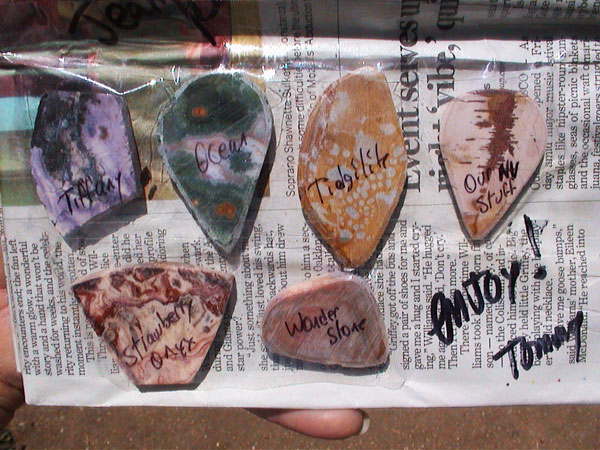
|
|
|
|
Post by rockpickerforever on Apr 30, 2019 14:02:35 GMT -5
Most of my freeform cabs are variations on triangles, many from small bits and scraps
Mojave turquoise (man made)
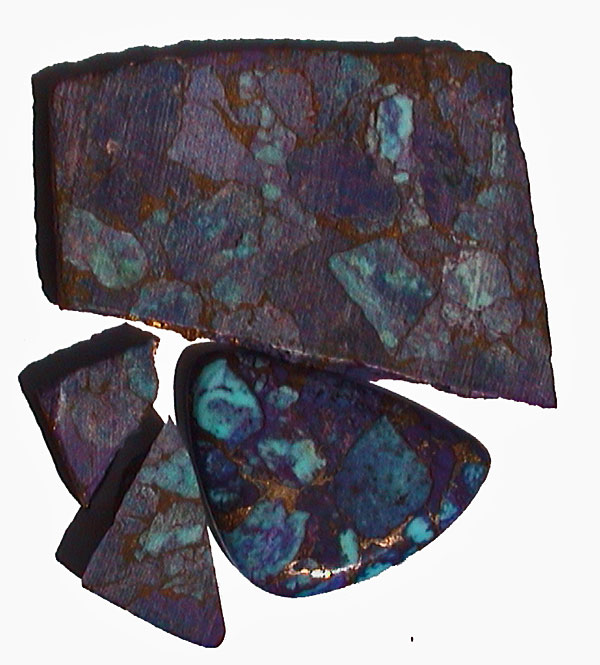
More of a flat top than a cab. 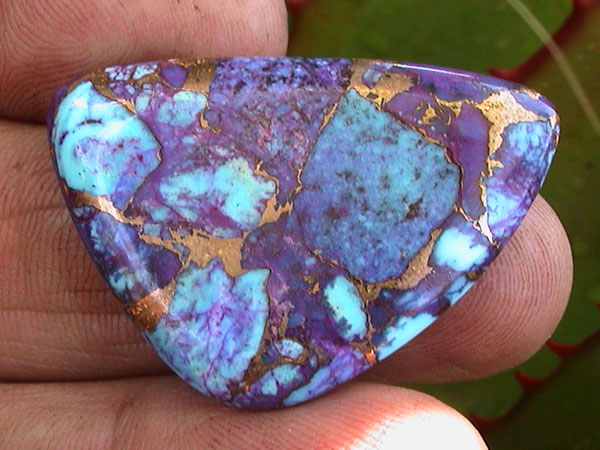
Unknown green rock from a small bit, I think from near area 54. Gift from barclay, cabbed some time ago
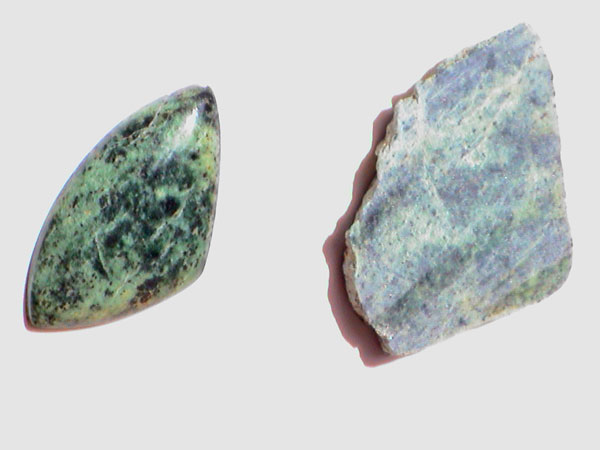
Pilbara Picasso jasper
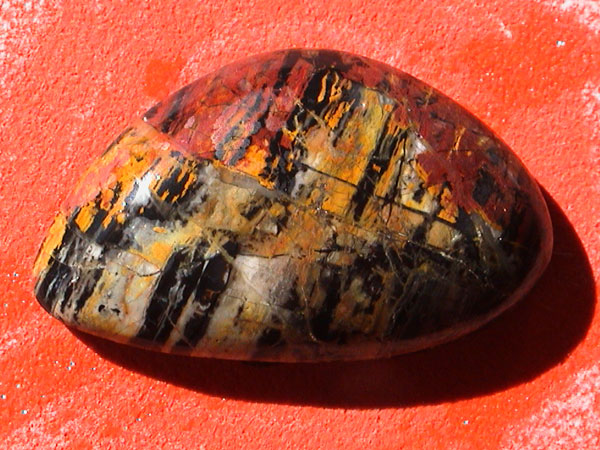
|
|
|
|
Post by miket on Apr 30, 2019 14:22:39 GMT -5
Most of my freeform cabs are variations on triangles, many from small bits and scraps
Mojave turquoise (man made)

More of a flat top than a cab. 
Unknown green rock from a small bit, I think from near area 54. Gift from barclay , cabbed some time ago

Pilbara Picasso jasper

I like these! That's exactly how I've been doing things and I've wondered if what I was doing was wrong or right. 99% of what I've been trying to learn to cab with is self-collected and I decided that maybe there wasn't a "correct" shape. They are what they are. Some of it is from slabs I've cut from those stones and some are just cab-sized rocks that I thought would look nice so I start grinding away. The cab usually takes on a life of it's own and shows it's shape to me- or fractures and I deal with what's left!  Anyway, nice cabs! |
|
Deleted
Deleted Member
Member since January 1970
Posts: 0
|
Post by Deleted on Apr 30, 2019 14:27:32 GMT -5
Any stone that does not fit a prescribed shape (round, oval, pear, etc) is said to be a free-form. I'd narrow it even further: shape is irrelevant except in those relatively few shapes and sizes for which pre-made cabochon settings are manufactured. Other than those (mostly ovals for cabs, and mostly aimed toward stones cut for the mass market), a custom setting is going to have to be made. So you largely needn't worry about this unless cutting for particular pre-made settings. Go for the best pattern, color, optical phenomenon, etc. that you can from any given stone. If you are doing matched sets or graduated sets of cabs, then shape is more of a consideration, though they still needn't be standard ovals and rounds. |
|
|
|
Post by rockpickerforever on Apr 30, 2019 14:28:04 GMT -5
Most of my freeform cabs are variations on triangles, many from small bits and scraps
Mojave turquoise (man made)

More of a flat top than a cab. 
Unknown green rock from a small bit, I think from near area 54. Gift from barclay , cabbed some time ago

Pilbara Picasso jasper

I like these! That's exactly how I've been doing things and I've wondered if what I was doing was wrong or right. 99% of what I've been trying to learn to cab with is self-collected and I decided that maybe there wasn't a "correct" shape. They are what they are. Some of it is from slabs I've cut from those stones and some are just cab-sized rocks that I thought would look nice so I start grinding away. The cab usually takes on a life of it's own and shows it's shape to me- or fractures and I deal with what's left!  Anyway, nice cabs! Thanks, Mike. There is no right or wrong. It is a creative process. And, just like art, everyone may have a different feeling about it. I'd say you are doing it right! |
|